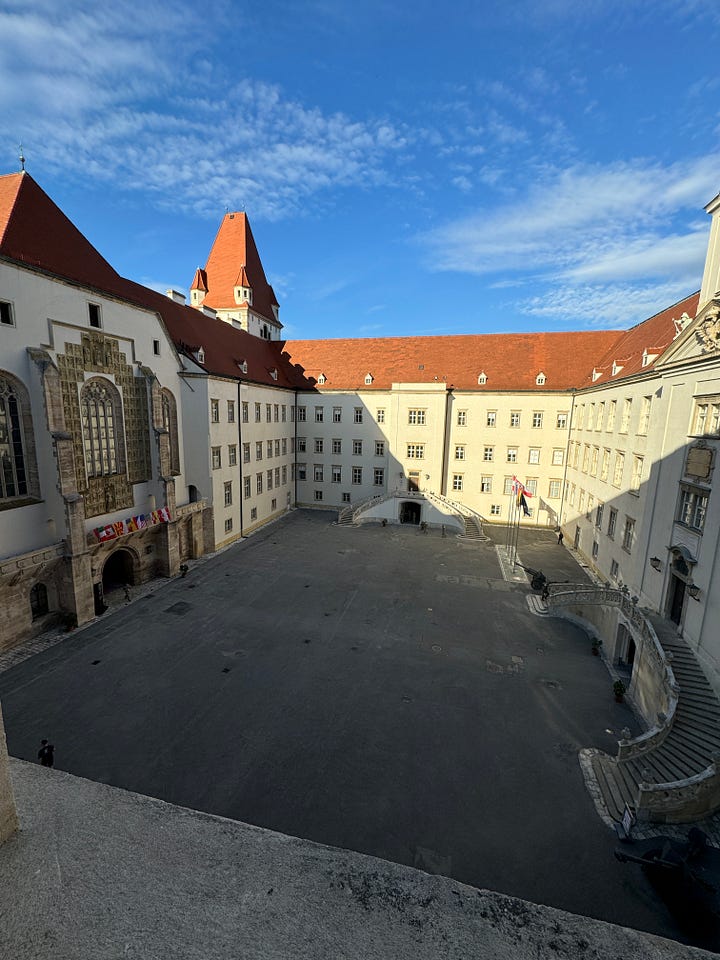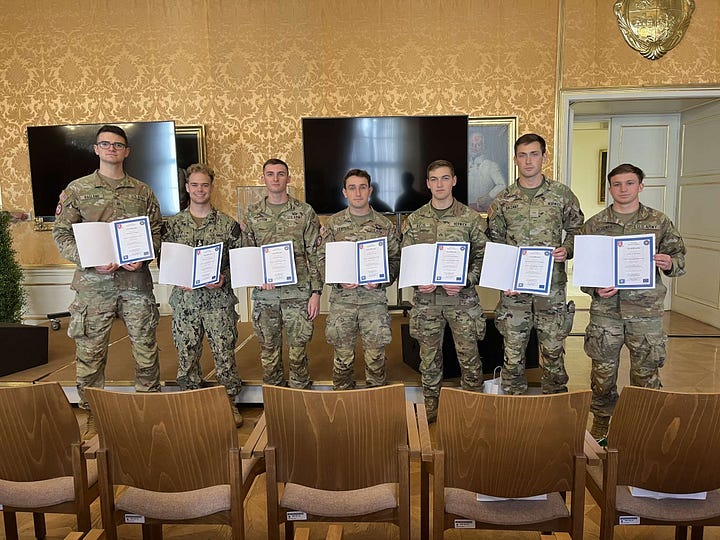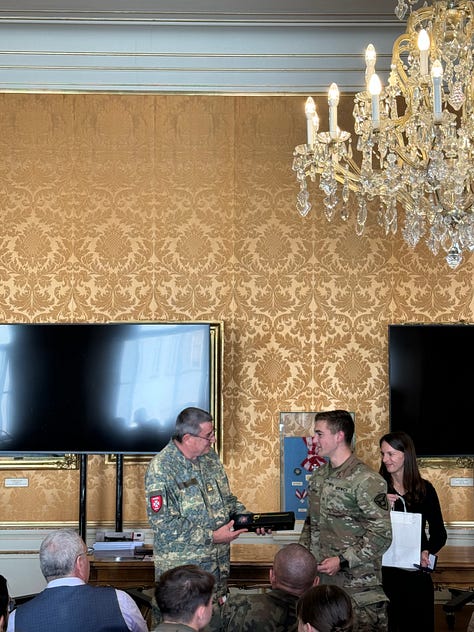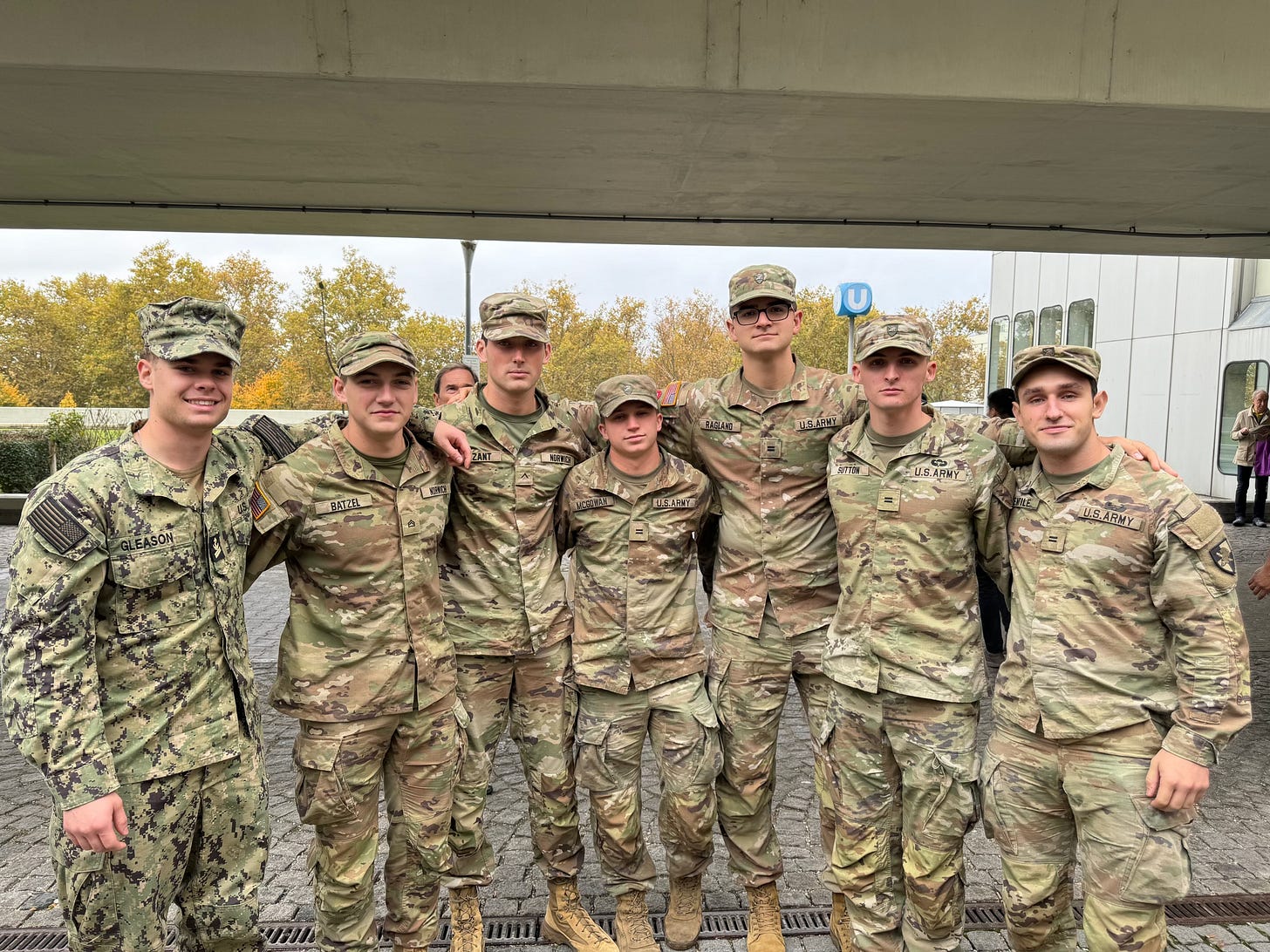This fall, two cadets affiliated with the Peace and War Center were presented with the opportunity to attend the annual Common Security and Defense Policy (CSDP) forum, organized by the European Union and hosted by The Republic of Austria’s 273 year old Theresian Military Academy. This event brings together military cadets from around the European Union and its North American partner nations. Including Canada, Spain, Lithuania, Romania, Bosnia, Italy, Germany, and the United States through West Point, The Naval Academy, and Norwich University.
The weeklong event consisted of lectures from general officers and experts on various military topics, networking events, group presentations, physical team building competitions, viewing of Austria’s National Day ceremonies, and a visit to the United Nations in Vienna.




National Day Celebrations at Hofburg Palace, Vienna. National Day celebrates Austrian independence from foreign nations following the Second World War
Cadets & Staff during their visit to the United Nations in Vienna.
American Cadets and Midshipmen from The US Military Academy at West Point, The Naval Academy at Annapolis, and Norwich University at the closing ceremony.
The Theresian Military Academy, housed within the castle of Weiner Neustadt.
CDT Wil Bazant, USMC
Wil Bazant is a senior criminal justice student at Norwich University. He is contracted with the US Marine Corps, on track to be commissioned as a 2nd Lieutenant in May of 2025 upon graduation. He holds a leadership position within the contingent of Norwich Marines and serves as a Police Officer in a local municipality.
Reflections:
During my closing remarks to the forum, I noted that while the United States was quite clearly not a member of the European Union, it did not diminish the value of our presence in the slightest. The root of so much conflict is merely in a lack of proximity and communication. This tension and misunderstanding often dissipates if parties are brought to the table early enough.
This led to me developing the potentially unorthodox opinion that while the forum played host to strong academic content, it’s true value and mission was bringing the next generation of leaders together so they could develop the inroads that are necessary for a successful career and the accomplishment of multi-national missions. The cogs of bureaucracy are lubricated by relationships (and paperwork). The relationships I built within the span of a week were unusually strong and I attribute this to the enthusiasm reciprocated by every cadet I met.
I specifically recall a lecture by a Polish officer charged with leading a multinational peacekeeping force in a Balkan nation, as well as a conversation with a German cadet who had served with US Marines at Abbey Gate, HKIA, during the evacuation of Afghanistan. These interactions gave me the unfiltered strengths and challenges faced during missions which were as “multi-national” as one could get.
From the Lithuanians preparing to counter the Russian Bear lurking at their doorstep, to the Austrians grappling with what path their future foreign policy should take, and to the Spanish who were reeling from ongoing domestic natural disasters. Everyone I met offered a different outlook that Americans would do well to learn from.
The opportunity for a cadet to travel abroad is more limited than his civilian counterparts, and the opportunity to work with other future officers is equally elusive. Which is why I feel so appreciative for having been a part of it. I hope cadets in the future might also be able to benefit from this experience
CDT Jack Batzel, USMC
Jack Batzel is a Junior Studies in War and Peace major at Norwich University. He is contracted with the United States Marine Corps, on track to commission as a 2nd Lieutenant in May of 2026 upon graduation. He holds leadership positions within the contingent of Norwich Marines, the Corps of Cadets, and other extracurricular organizations.
Reflections:
Attending the Common Security and Defense Policy Module hosted at the Theresian Military Academy was my first experience working with the Peace and War Center as well as my first time studying abroad as a college student. I found the academic presentations to be incredibly insightful, but the opportunities to interact with Officers, Cadets, and policy makers from a range of nations was equally as impactful. This gathering of future officers, enriched and guided by the academic content, led to numerous impactful conversations between classes, over dinner, or even in the gym. These conversations ranged from the European Union’s struggle between national and supranational identities to the perception of the United States on the global stage. Speaking to Cadets from across North America and Europe led me to the conclusion that we are far more alike than we are different, and that common ground can be found by anyone willing to try. Cultural barriers are merely the result of distance and are a minor hurdle that can be overcome by a smile and a handshake. In a time of global tensions and division, we seem to overcomplicate potential solutions when the answer is as simple as engaging in sincere and compassionate communication. I found that we are all united by a common desire to make the world a better place, and consequently bound together to forge that future ourselves through enhanced cooperation and understanding.











